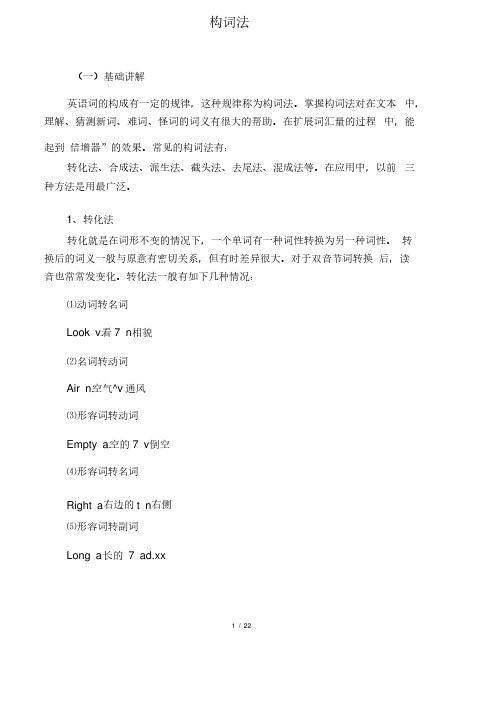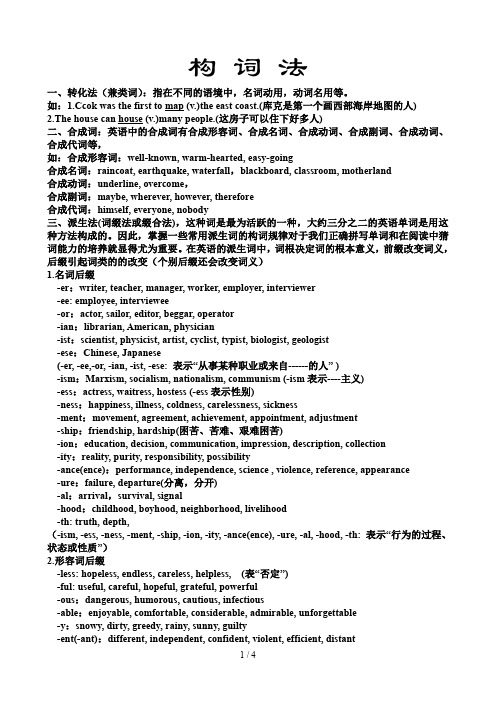英语构词法讲解及练习详解
考研英语基础构词法练习及答案详解

1.表示否定或反义的常用词缀:
反
义
否
定
反
义
否
定
前
缀
前
缀
位置
意义
例词
a-
an-
not,without否定
apo1itical不关心政治的;
anonymous匿名的,无名的,不知名的
ab-
away from
abnormal非正常的;
a-
ab-
abs-
在“t”“v”之前
avoid避免
abstain弃权,戒;
mal-
bad,badly恶,不良
maltreat虐待;malfunction机能失常;
malcontent不满的;malnutrition营养不良;
maladminister对……管理不善
mis-
bad,badly错,坏
mistake错误
non-
not否定
nonmetal非金属;
non-ferrous非铁的;
fore-
before前.预先
foremost最前的;
forecast预测;
forefather前人,祖先;
forehead前额;
foretell预言;
foreground前景;
foresee预见
pre-
before之前
prehistory史前:
prerequisite先决条件;
prelude序言前奏曲;pre-election大选前;
半
demigod半神半人;
hemicycle半圆形建筑
semiautomatic半自动的;semimechanized半机械化的
英语构词法讲解及相关练习

英语构词法讲解及相关练习⾼中英语构词法讲解与练习在英语中,词的构成⽅式主要有三种:派⽣、合成、和转化。
⼀、派⽣Derivation注意:-ese, -ian, -ist 既可以构成名词,⼜可以构成形容词。
⽅式:1. 直接写在⼀起。
2. ⽤连字符(-)连接。
3. 由两个分开的词构成。
(5)合成代词whoever,, whatever, everyone, nobody, myself, something, anything,三、转化Conversion: 指⼀个词不变化词形,⽽由⼀种此类转化为另⼀种词类或⼏种词类。
1. 名词和动词之间的转化telephone电话——打电话, mirror镜⼦——像镜⼦⼀样反映, drink喝——饮料, record录⾳——记录, name, date, hand, study,2. 形容词转化为动词perfect完美的——使完善3.名词转化为形容词(副词) front前⾯——前⾯的4.形容词转化为名词chief 主要的——⾸领巩固练习Ⅰ⽤适当的形式填空。
1. The mother didn’t know why her daughter was crying _______. (noise)2. He was one of the best _______ in yesterday’s football match. (play)3. Look! How ______ Kate is laughing! (happy)4. It snowed _____ last night and now the streets are covered with snow. (heavy)5. Edison was a great ______. During his life he had many ______. (invent)6. More and more _____ have come to visit China over these years. (foreign)7. We want _________ reasons for your failure to help. (satisfy)8. Please give me some reference work. It will ______ my task. (simple)9. The doctor said that Mary’s mother needed an _______.(operate)10. Thank you for your _________. (kind)11When in Rome, do as the _____ do. (Rome)12. The teacher was pleased with her _______. (honest)Ⅱ.单选1. That man was ________enough not to tell the manager that he would not do the job.A. careB. carefulC. carelessD. carelessness2. The soldier died for saving the child,so his________ is heavier than Mount Tai.A. dieB. deadC. diedD. death3. The three- ________chair isn’t suitable for a young child. He may fall off.A. leggingB. leggedC. legsD. leged4.When the teacher praised him for working out the maths problem,Jack looked________about at his classmates. A. proud B. proudly C. pride D. pridely5.To everyone’s ________,the girl finished the job quite well.A. satisfiedB. satisfactoryC. satisfyingD. satisfaction6.—What are you doing here?—Oh,my teacher asked me to write a passage about ________in English.—You can write________passage in English?A. 600 words;a 600-wordsB. 600-word;a 600-wordsC. 600 words;a 600-wordD. 600 words;a 600-words7. No one should enter the spot without the________of the police.A. permitB. permissionC. permittingD. permittence8. You must come with us to the police ________.Our head is waiting for you.A. headquartersB. headlineC. headmasterD. headache9.Letting that animal escape was no accident;you did it ________.A. intendB. intentionC. intentionallyD. intentional10. The shop owner welcomed all the guests with a________smile.A. practiceB. practiceC. practicalD. practiced11. My TV is out of order. Can you tell me what is the________news about Iraq War?A. latelyB. latestC. laterD. latter12. Canada is mainly an________country.A. English-speakingB. speak-EnglishC. spoken-EnglishD. English-spoken13. How________ he is! He is always acting________.He is really a ________.A. foolish;foolishly;foolB. fool;foolish;foolC. foolish;fool;foolD. foolishly;foolish;fool14. The necklace that she lost is very expensive. It’s of great ________.15. We have to learn ________technology from other countries.A. advanceB. advancingC. advantageD. advanced16. The children live in a village ________.They come here almost every day.A. nearbyB. nearC. nearlyD. near by17.You’d better give up smoking if you want to keep ________.A. healthB. healthyC. healthilyD. healthier18.________ speaking,I di dn’t do it on purpose.A. HonestlyB. HonestC. HonestyD. DishonestⅢ.根据上下⽂语境和提⽰的⾸字母,在划线处写出⼀个合适的词。
英语构词法总结与练习

英语构词法总结与练习a合成法(1)合成法即是由两个或更多的词合成一个词。
合成词在英语中比较活跃,合成形容词很常见,多数用作定语,有些作表语;合成名词作主语或宾语;合成动词作谓语;合成副词作状语。
quick-servicecounter快餐部,airsick昏飞机,air-dropped空投,warm-heartedly热情地,sightseeing游览观光,cross-roads十字路口(2)制备形容词的形成方法如下:①形容词/数词+名词+ednoble-minded高尚的,good-tempered脾气好的warm-hearted,cold-blooded,three-legged,one-eyed②形容词+现在分词good-looking漂亮的,fine-sounding悦耳的,easy-goingsweet/bad-smelling,cheap-looking③副词+现在分词hard-working勤奋的,far-reaching深刻的ever-lastingrapidlycincreasinglong-sufferingnever-ending④名词/代词+现在分词:peace-loving爱好和平的,english-speakingmatch/flower-sellingflesh-eatingrecord-breakingself-lockingtime/gas-savingman-killing⑤名词+过去分词state-owned国有的,heartfelt由衷的self-taughtsnow-covered⑥副词+过去分词well-known著名的,wide-spread广为流传的well-informedbadly-woundedwidely-usednewly-builtbadlycmanagedover-fed⑦形容词/数词+名词large-scale大规模的,high-class高级的second-handlong-distancehigh-speedafivecyearplan⑧名词+形容词duty-free退税的,airsick昏飞机的ice-coldhome-sick⑨另外除了其他方式形成的合成词,例如:all-round全面的,everyday日常的,face-to-face面对面的,first-rate一流的(3)合成名词的常见构成方式有:①名词+名词silkworm蚕,bloodtest血常规safetybelt,chinatown,trafficlight,shoelaceclassroom②形容词+名词double-dealer两面派,shorthand速记③v-ing+名词waiting-room候车室,sleeping-pill安眠药④动词+名词pickpocket小偷,break-water防尘堤⑤名词+动名词handwriting书法,sum-bathing日光浴⑥动词+副词get-together联欢会,break-through突破breakdowntake-offcheckcup⑦副词+动词⑨另外还有许多副词、代词等也是合成词,如:maybe也许forever永远whole-hearted全心弯叶的myself我自己everything一切whatever不管什么moreover而且however但是nevertheless尽管如此b转化法:不添加任何成分,不改变词形,把一个词由一种词类转用为另一种词类的方法叫做转变法。
(完整版)史上最全的 构词法 用法详解

史上最全的构词法用法详解语言中词的总和构成词汇,但是词汇并不是一堆杂乱无章、互不相关的群体,而是一个严密体系,在这个结构的体系中,词与词之间有着各种各样的联系。
英语中的这些联系的规律总结起来就是构词.英语中构词的方法就是构词法。
构词法主要有合成法、转化法、派生法和缩略法四种.掌握构词法是迅速扩大词汇量的重要方法之一。
第一节合成法合成法就是指由两个或两个以上的单词合成的词叫合成词。
这种构词方式主要有两种:复合法、结合法。
合成法主要是构成合成名词和合成形容词.复合法构成的复合词,它们各个结合的部分相互间的语法关系是紧密相关的.如blackboard和darkroom都是形容词和名词形成的结构,writing desk是动词名词和名词形式的结构。
结合法形成的词是形态合成词,它的结合是用一个起来连接作用的中缀来把两个或两上以上的词根词素紧紧的连缀在一起。
如,用辅音字母-s-来缀全两个词根词素构成的词有:salesman, townspeople等。
合成的方式常见的有如下几种:一、合成名词1、名词/代词+名词:woman—doctor, women—doctors, workshop, spaceship, he—goat, coal fire, motorcycle, gas cooker, oil well, power plant, silk worm, gold mine, bottleneck, piano keys, telephonereceiver, television screen, chairman, fireman, motorman, police-officer, postman, pine tree, girl friend,boy friend, goldfish, raindrop, birdcage, breakfast time, flowerbed, tearoom,2、动词+名词:blowpipe, flashlight, watchdog, call—girl, searchlight3、形容词+名词:blacksmith, blackboard, supermarket, superman, darkroom, blackbird, highchair, hothouse,greenhouse, madman4、动名词+名词:reading—room, sitting—room, classroom, schoolroom, dining room, building materials,dancing girl, cleaning women, flying machine, washing machine, working conditions, boilding point, drinking water, swimming pool, drinking cup, typing paper, writing desk, sewing machine, walking stick,5、名词+动名词:machine—building, shoe—making, paper-correcting, book—keeping, dressmaking,letter-writing, story—telling, town-planning, handwriting, sun—bathing, horse riding, churchgoing, daydreaming6、动词+副词:stand—by, take-off, cut—off, breakdown7、副词+名词:downfall, rainfall, outhouse8、现在分词+名词:running dog, running water, flying fish, rising sun, burning stick,9、名词+介词+名词:man—of-war, editor-in—chief,10、名词+连词字母+名词:handiwork, nowadays11、介词/副词+名词:afternoon, inland, overbalance二、合成形容词1、形容词+名词+ed:five—storeyed, one-eyed, double—faced, blue-eyed,2、名词+名词+ed:honey—mouthed,3、名词/代词+分词:man—made, heart—broken, self—educated, snow—covered, man—eating, peace-loving, paper —making, ocean—going, heartfelt, handmade, home—made, sunburnt,weather—beaten4、名词/代词+形容词:color-blind, ice-cool, seasick, airsick, tax—free, grass—green, snow—white, rock-hard,sea-green5、形容词/数词+名词:full—time, high—grade, second—hand,6、形容词/数词+分词:ready-made, sleepy-looking, good—looking,7、副词+分词:far-reaching, so—called, hard-working, far-reaching, well-meaning, newly-laid,well-meant, wide-spread8、副词+形容词:ever-green, under—ripe,9、形容词+形容词:dark-blue, red—hot, grey—green10、介词+名词:downhill, overnight三、合成副词1、形容词+名词:sometimes, meanwhile2、副词+名词:oftentimes, indoors, outdoors, overhead3、介词+名词:alongside, beforehand4、名词+形容词:skyhigh, stonestill,5、副词+介词:nearby, upalong,四、合成动词1、名词+动词:overhear, underline2、形容词+动词:moonwalk3、副词+动词:white-wash, safeguard五、其它合成词1、合成代词:everybody, everyone, everything, anyone, anybody, anything2、合成介词:outside, inside, throughout第二节转化法不用借助构词词缀,把一个单词从一种词类转化成另一种词类的方法就是转化法。
英语基础知识 构词法的讲解与训练

英语基础知识构词法的讲解与训练构词法英语构词方法主要有三种:即合成法(compounding)、派生法(derivation )和转化法(conversion)。
1. 合成法:将两个或两个以上的单词合成在一起而构成的新词,叫做合成词。
如:snow-white 雪白的;day-long 整天的;overcome 克服;downstairs 在楼下2. 派生法:所谓派生,即在词根上加前缀或后缀构成另一个与原意略有变化或截然相反的词。
例:discover 发现;disagree 不同意的;nation→national 民族的,国家的;nature→natural 自然的;treatment 治疗;development 开发展3. 转化法:英语单词的词性非常活跃,名词用作动词,动词转化为名词,形容词用作动词等现象非常普遍,这种把一种词性用作另一种词性的方式就叫做词性的转化。
如:(1)有大量动词可以转化为名词,有时意思没变化。
Let me have a try. 让我试一试。
(2)名词转化为动词。
Have you booked your ticket? 你的票订好了吗?(3)一些表示某类人的名词也可做动词。
If so,we shall be badly fooled. 如果这样我们就会上大当。
(4)形容词转化为动词。
The train slowed down to half its speed. 火车速度减慢了一半。
1、合成法(1)合成形容词①名词+现在分词例:English-speaking 讲英语的,south-facing 朝南的②名词+过去分词例:man-made 人造的,water-covered 被水覆盖的③名词+形容词例:snow-white 雪白的,day-long 整天的④形容词+名词+-ed 例:warm-hearted 热情的,kind-hearted 好心肠的⑤形容词/副词+现在分词例:good-looking 好看的,funny-looking 滑稽的⑥副词+过去分词例:well-known 出名的, deep-set(眼睛)深陷的⑦副词/形容词+名词例:right-hand 右手的,full-time 专职的⑧数词+名词例:100-meter 100米的,million-pound 百万英镑的⑨数词+名词+形容词例:180-foot-high 180英寸高的,10-year-old 10岁的⑩数词+名词+-ed 例:four-footed/legged 四脚的,one-eyed 独眼龙的(2)合成名词①名词+名词例:weekend 周末,classroom 教室,bookshop 书店②形容词/介词+名词例:gentleman 绅士,loudspeaker 扬声器③动词+名词例:typewriter 打字机,cookbook 烹调书④名词+动词例:daybreak 破晓,toothpick 牙签⑤动词-ing形式+名词例:reading-room 阅览室,sleeping-car 卧车车厢⑥副词+动词例:outbreak 爆发,downpour 倾盆大雨⑦名词+动名词例:handwriting 笔迹,sun-bathing 日光浴⑧名词+in/to+名词例:mother-in-law 岳母,brother-in-law 姐夫(3)合成动词①副词+动词例:overthrow 推翻,understand 理解②形容词+动词例:broadcast 广播,whitewash 粉刷③名词+动词例:typewrite 打字,sleepwalk 梦游(4)合成副词①介词+名词例:underfoot 脚下,beforehand 事先②形容词+名词例:hotfoot 匆忙地,someday 有朝一日③形容词+副词例:anywhere 任何地方,outwards 向外、(5)合成介词:within在……之内,without没有,inside在……里边,into进入(6)合成代词:myself我自己,ourselves我们自己,anyone任何人,nobody没有人nothing 没东西,somebody有人。
初高中英语词汇构词法详解

构词法(一)基础讲解英语词的构成有一定的规律,这种规律称为构词法。
掌握构词法对在文本中,理解、猜测新词、难词、怪词的词义有很大的帮助。
在扩展词汇量的过程中,能起到倍增器”的效果。
常见的构词法有:转化法、合成法、派生法、截头法、去尾法、混成法等。
在应用中,以前三种方法是用最广泛。
1、转化法转化就是在词形不变的情况下,一个单词有一种词性转换为另一种词性。
转换后的词义一般与原意有密切关系,但有时差异很大。
对于双音节词转换后,读音也常常发变化。
转化法一般有如下几种情况:⑴动词转名词Look v.看7 n相貌⑵名词转动词Air n.空气空气^v通风⑶形容词转动词Empty a.空的空的7 v倒空⑷形容词转名词Right a右边的t n右侧⑸形容词转副词Long a 长的长的7 ad.xx1 / 22、合成法就是将两个或两个以上的词合成的一个新词。
合成词各个成分之 间有的要用连字2、合成法就是将两个或两个以上的词合成的一个新词。
合成词各个成分之符连接,有的直接连在一起。
符连接,有的直接连在一起。
、派生法是在一个词根的前面或后面加上某个词缀来产生新词。
加在前 面的叫前缀,加3、派生法是在一个词根的前面或后面加上某个词缀来产生新词。
加在前在后面的词缀叫做后缀。
在后面的词缀叫做后缀。
前缀多引起词义的变化而不改变词性。
后缀对词性、词义都可能有影响。
前缀多引起词义的变化而不改变词性。
后缀对词性、词义都可能有影响。
例如:例如:前缀词根后缀dis agree ment (不同意n .)前缀词根后缀、截短法(缩略法)截短法,即将单词缩写,词义和词性保持不变,主要有 截头、去尾、4、截短法(缩略法)截短法,即将单词缩写,词义和词性保持不变,主要有截头去尾等形式。
截头去尾等形式。
⑴截头 telephone t phone aeroplane t plane⑴截头omnibus bus⑵去尾⑵去尾mathematics t mathsco-operate c o pexamination examkilogram kilolaboratory labtaxicab taxi⑶截头去尾⑶截头去尾influenza flurefrigerator fridgeprescription script5、混合法(混成法)、混合法(混成法)混合法,即将两个词混合或各取一部分紧缩而成一个新词。
语言学 常见英语构词法解析

Conversion 词性转化法1.基本概念:词性转化法英语中有些单词,词形不变, 词性却可以由一种转化成另一种。
这就是转化。
单词转换后的意义往往与未转换前的意义有密切的联系。
也叫做“零位后缀派生法”或“零位派生法”;是指有一种词性转化为另一种词性往往与之前的意义联系密切。
2.分类:A.名词转化为动词①表示物品、器具和地点的名词转化为动词,表示把……放人,或置于……之中。
如:The books have already been shelved.②表示人物称呼的名词转化为动词表示具有这类人的典型特征。
如:Whenever I am sick, my mother doctors me and nurses me carefully.③表示人体各部分的名词几乎都可以转化为动词,通常用来表示工具。
如:He tried very hard to elbow his way to the front.④表示动物,植物及其典型动作的名词转化为动词时,有很强的隐喻含义。
如:The company has branched out all over the world.⑤表示物质和实物的名词转化为动词通常表示结果,具有“使……成为”,或“把……变成”的含义.如:Where can we cash some money?⑥抽象名词转化为动词。
如:We are angered by his unruly behavior.⑦表示时间的名词转化为动词。
如:He has been dating the pretty girl for about five years. B.形容词转化为名词可分为两类,一类是完全转化(full conversion), 另一类是部分转化(partial conversion)①完全转化:完全转化为名词的形容词具有名词的全部特征,能作不可数名词表示抽象概念,能加s构成复数,加s’构成所有格,也可以用形容词来修饰。
英语构词法详细讲解

构词法一、转化法(兼类词):指在不同的语境中,名词动用,动词名用等。
如:ok was the first to map (v.)the east coast.(库克是第一个画西部海岸地图的人)2.The house can house (v.)many people.(这房子可以住下好多人)二、合成词:英语中的合成词有合成形容词、合成名词、合成动词、合成副词、合成动词、合成代词等,如:合成形容词:well-known, warm-hearted, easy-going合成名词:raincoat, earthquake, waterfall,blackboard, classroom, motherland合成动词:underline, overcome,合成副词:maybe, wherever, however, therefore合成代词:himself, everyone, nobody三、派生法(词缀法或缀合法),这种词是最为活跃的一种,大约三分之二的英语单词是用这种方法构成的。
因此,掌握一些常用派生词的构词规律对于我们正确拼写单词和在阅读中猜词能力的培养就显得尤为重要。
在英语的派生词中,词根决定词的根本意义,前缀改变词义,后缀引起词类的的改变(个别后缀还会改变词义)1.名词后缀-er:writer, teacher, manager, worker, employer, interviewer-ee: employee, interviewee-or:actor, sailor, editor, beggar, operator-ian:librarian, American, physician-ist:scientist, physicist, artist, cyclist, typist, biologist, geologist-ese:Chinese, Japanese(-er, -ee,-or, -ian, -ist, -ese: 表示“从事某种职业或来自------的人” )-ism:Marxism, socialism, nationalism, communism (-ism表示----主义)-ess:actress, waitress, hostess (-ess表示性别)-ness:happiness, illness, coldness, carelessness, sickness-ment:movement, agreement, achievement, appointment, adjustment-ship:friendship, hardship(困苦、苦难、艰难困苦)-ion:education, decision, communication, impression, description, collection-ity:reality, purity, responsibility, possibility-ance(ence):performance, independence, science , violence, reference, appearance-ure:failure, departure(分离,分开)-al:arrival,survival, signal-hood:childhood, boyhood, neighborhood, livelihood-th: truth, depth,(-ism, -ess, -ness, -ment, -ship, -ion, -ity, -ance(ence), -ure, -al, -hood, -th: 表示“行为的过程、状态或性质”)2.形容词后缀-less: hopeless, endless, careless, helpless, (表“否定”)-ful: useful, careful, hopeful, grateful, powerful-ous:dangerous, humorous, cautious, infectious-able:enjoyable, comfortable, considerable, admirable, unforgettable-y:snowy, dirty, greedy, rainy, sunny, guilty-ent(-ant):different, independent, confident, violent, efficient, distant-tic: optimistic, pessimistic, enthusiastic, characteristic-ary: necessary, revolutionary, imaginary-(c)al: historical, unusual, professional, magical, physical, universal, classical, logical, informal-some:handsome,troublesome-en:woolen, golden,-an:African, American-ive:active, attractive, creative(-ful, -ous, -able, -y, -ent, -some, -en, -an, -ive :表示“属性、倾向、相像”)3.副词后缀-ly:really, nearly, differently, finally, fluently, gradually-wise: (表示“方向、样子、状态、在------方面”)likewise, otherwise-ward(s): upward, downward, inward, outward, backward, forward, afterwards4.动词后缀-ize(-ise): organize, apologize, specialize-en:harden, fasten(使固定、使牢固), soften-fy: beautify, simplify, classify-ate: separate, operate(-ize(-ise), -en, -fy, -ate: 表示“使成为、处理、作用”)5.反义词前缀un-: unfair, unknown, unlike, unwilling, unfit, unnecessary, unlikely, unkinddis-: dislike, disappear, disadvantageim-: impossible, immoral, impatient, impractical, improperin-: incorrect, inappropriate, informalnon-: nonsmoker, nonsense,non -drinker(un-, dis-, im-, in-, non-: 表示“无、不、非”)mis-: mistake, mislead, misunderstandmal-:malfunction(发生故障;不起作用)(mis-, mal: 表示“反动作”)6.其他表示空间、位置、方向、关系、程度的前缀(1) a- , up-, over-, sur-, super- : 表示“在------之上”aboard, uphill, overlook, surface, supermarket, superstar(2)extra-, ex-, out- :表示“在-----之外”:extraordinary, export, outside, outdoors(3)under-, sub-, vice- :表示“在----之下”:underground, subway, vice-president(4)inter-: 表示“两者间”:internet, international, interpersonal(5)co-, con-, col-, com-: 表示“相同、相等合作”coexist(共存,和平共处), connect, collect, combine(6)trans-:表示“移动” translate, transform, transmit(传输信号等),transfer(转让、转移)(7)anti-反,抗,阻:anti-black, antibody, anti-depressant(抗抑郁的)(8)re-再,又:rebuild, rewrite, retell(9)micro-microbiology, microcomputer, microscope, microwave(微波)(10)tele-:远距离的,远的:telephone, television, telescope, teleprinter(电传打印机)四、缩略词缩略:为了称说方便,使事物称谓中的成分进行有规律的节缩或者省略叫做缩略。
- 1、下载文档前请自行甄别文档内容的完整性,平台不提供额外的编辑、内容补充、找答案等附加服务。
- 2、"仅部分预览"的文档,不可在线预览部分如存在完整性等问题,可反馈申请退款(可完整预览的文档不适用该条件!)。
- 3、如文档侵犯您的权益,请联系客服反馈,我们会尽快为您处理(人工客服工作时间:9:00-18:30)。
(C)表示两个,双边的前缀: bi- bicolor ( 双色的), bicycle
(D)表示相互, 交互, 在一起的前缀
inter—interview, international, internet (E)表示又,再,重新的前缀
4.动词变形容词
-al traditional, international, natural
5. 名词、形容词变动词: -ify
beautify, simplify -ize
realize -en
quicken, widen, sharpen
3. 转化 : 是指有一种词类转化为另一种词类。
单词转化后的意义往往与之前的意义联 系密切.
warm + heart + ed = warmhearted 热心肠的 good + looking = good-looking 相貌好看的 world +wide= worldwide 世界性的 hard+ working=hard-working 努力工作的
复合动词 over + come = overcome克服
英语构词法
英语构词法种类
英语构词法主要有三种: 合成、派生与转化。
另外缩写和简写也是构词法的一种。
1. 合成 : 有两个或更多的词合成一个词。
复合名词 class + room = classroom (名词+名词) black+ board= blackboard (形容词+名词) 复合形容词
另外还有许多缩写词是由各个单词的首字母组 成. CD ( compact disk) CCTV( China Central Television) NBA (National Basketball Association) UFO( unidentified flying object) UN( United Nations) ID( identification) USA( United States of America)
en + large adj. 大的 --- enlarge v. 扩大
后缀一般只引起词性上的变化而不 造成意思的变化。
care v. 照料 --- careful adj. 细心的
work v. 工作 --- worker n. 工人
常见的前缀
(A)表示否定的前缀: un-unfair,unhappy non-nonsmoker (常用在n. adj. adv. 前) in-inactive (常用在adj.后) dis-disagree, disappear im-impolite, impossible (用在b,p,m 开头的词前)
复合数词
(副词+动词)
fifty+ four= fifty-four
复合代词
everyone, somebody, anything, nobody ( 不定代词+名词)
复合副词 down+ stairs = downstairs在楼下 ( 形容词+名词) whole+ heartedly =wholeheartedly 全神贯注地 (副词+副词)
4. 缩写和简写 :
缩写和简写(也被称为截断法或缩 短法)主要采取: “截头”, “去尾” 或者 “既截头又去尾”的方法生成 新te词lep. hone---phone
airplane—plane
laboratory-lab
mathematics--math
advertisement—ad
examination--exam
2. 派生 : 是通过在词根上加前缀或者后缀
构成一个新词。
happy --- unhappy develop --- development
前缀一般只引起意思上的变化而不 造成词类的变化,只有少数能引起 词类的变化。
mis- 错误的 + understand v. 理解 --- misunderstand v. 误解
名词 ---- 动词
hand n. 手
--- vt. 上交
seat n. 座位
--- vt. 坐
nurse n. 护士 --- vt. 护理
Байду номын сангаас
oil n. 油
--- vt. 上油
time n. 时间 --- vt. 定时,测时
show n. 展览,展示—vt. 表演,演出
形容词----动词
slow( adj. 慢的)---slow ( v. 放慢) open (adj. 开着的)—open( v.开)
water n. 水 ------ water vt. 浇水 常见的转化形式两种:
动词 --- 名词
名词 --- 动词
形容词---动词
动词----名词
stop v. 停止 --- n.车站 watch v. 观看 --- n. 手表 look v. 看 ----have a look n. 看 walk v. 散步,走---take a walk n.散步 love v. 爱--- your love n. 爱
re—review, return, rewrite (F)表示远的前缀
tele– telephone, television
常见的后缀
1.动词变名词: -tion
education, invitation, prediction -ment
development, movement, disappointment
-er
teacher, worker, runner, singer
-or
visitor, sailor, tutor, actor
名词后缀补充:
-ist ( 人, 名词后缀) scientist, terrorist
-ese( 民族,语言,名词后缀) Chinese, Japanese
2.形容词变名词
-ness happiness, carelessness
-ity ability, possibility
3.名词变形容词: -y
windy, rainy, healthy, funny, cloudy -ish
foolish, feverish -some
handsome, troublesome -ous
dangerous, humorous -ful
helpful, careful, peaceful, colorful -less
homeless, helpless, careless
-ed surprised, balanced, talented -ing interesting, outstanding
